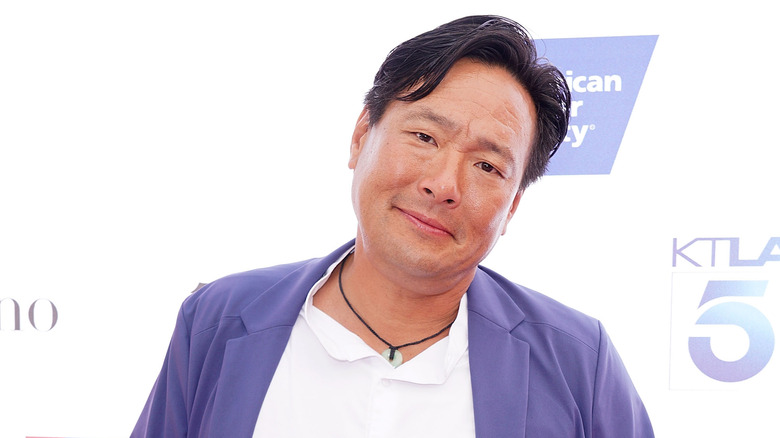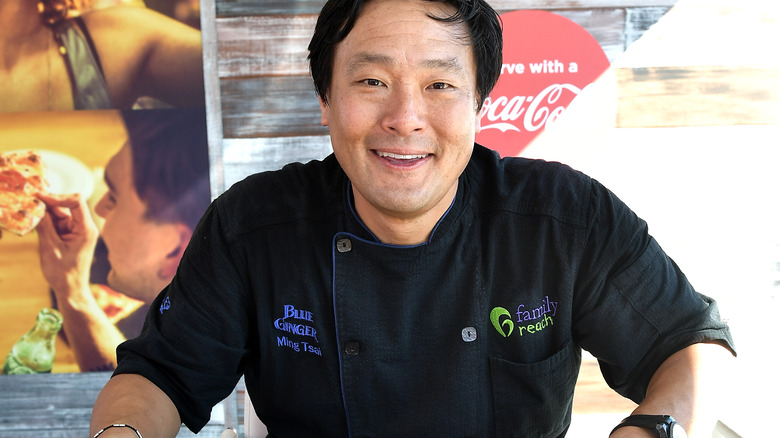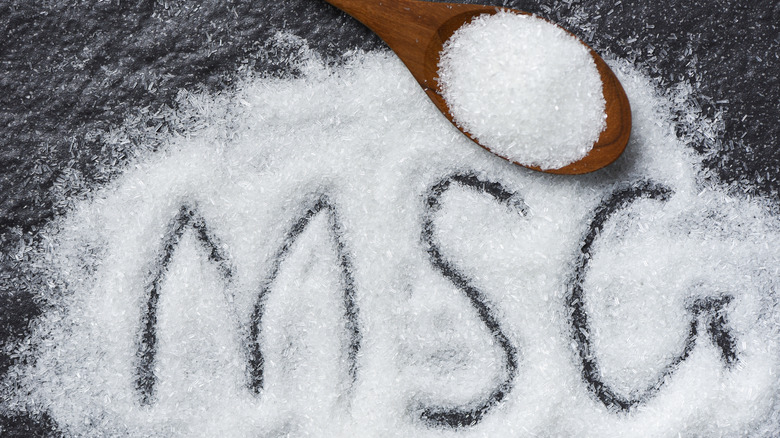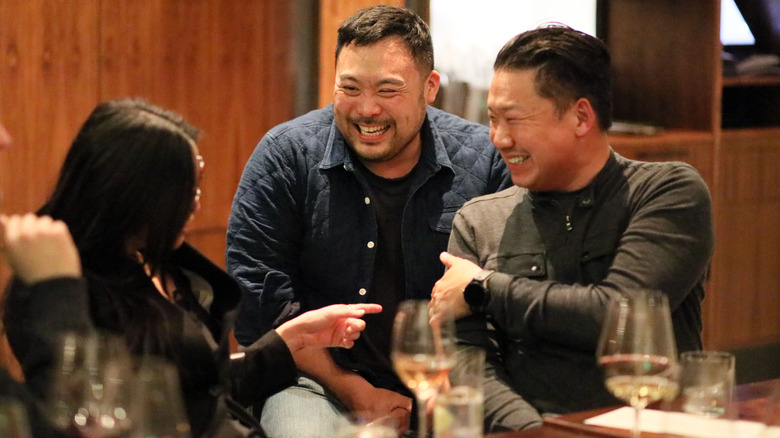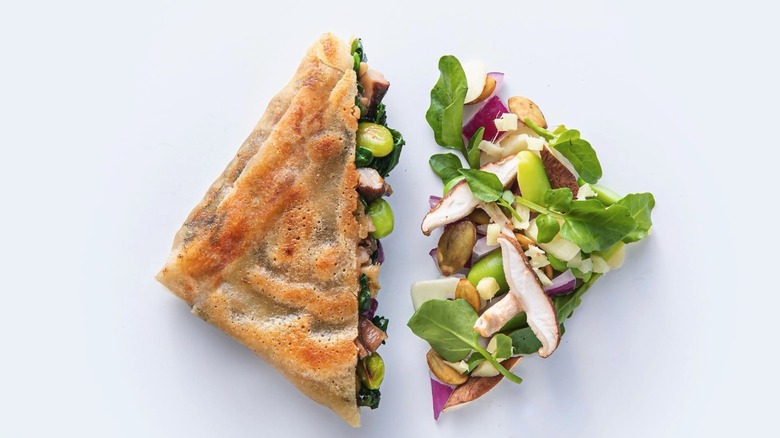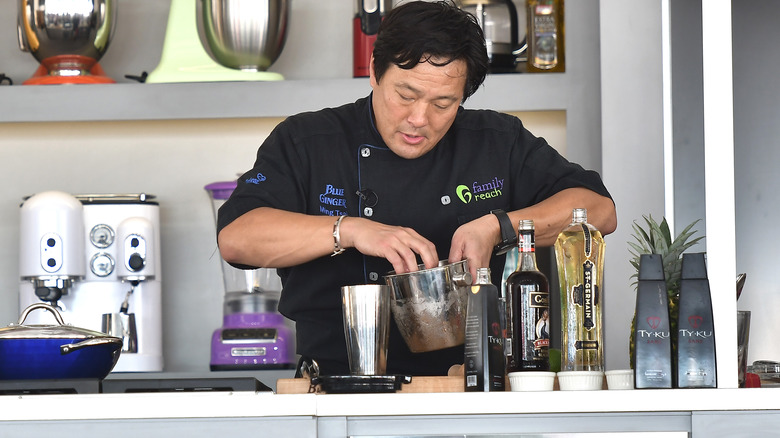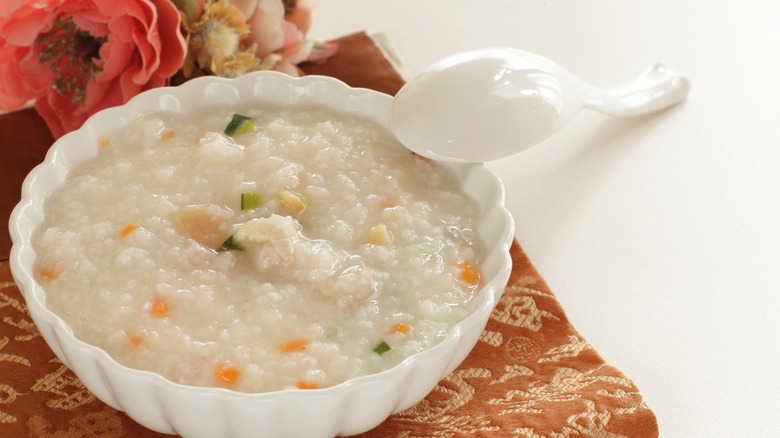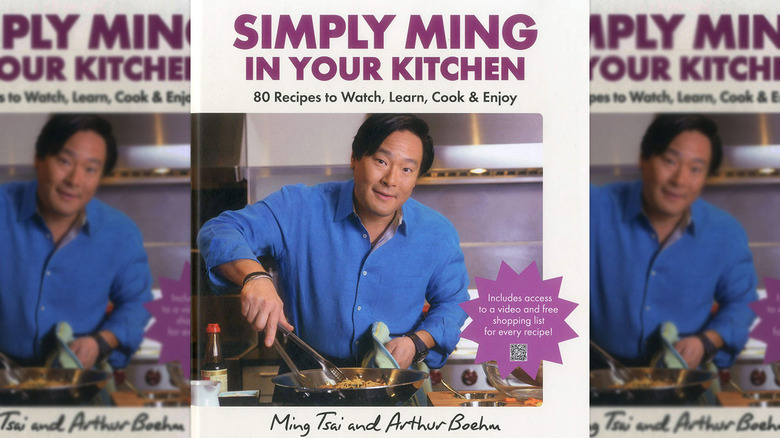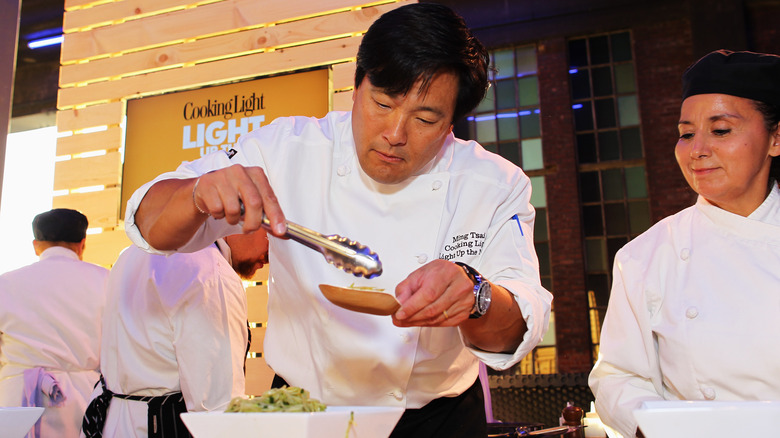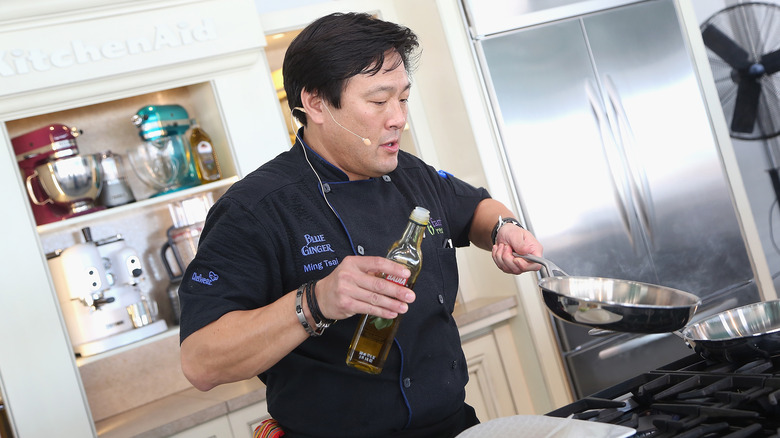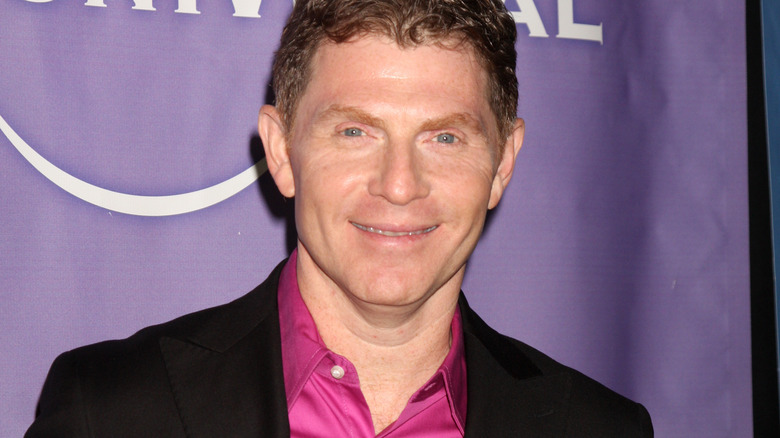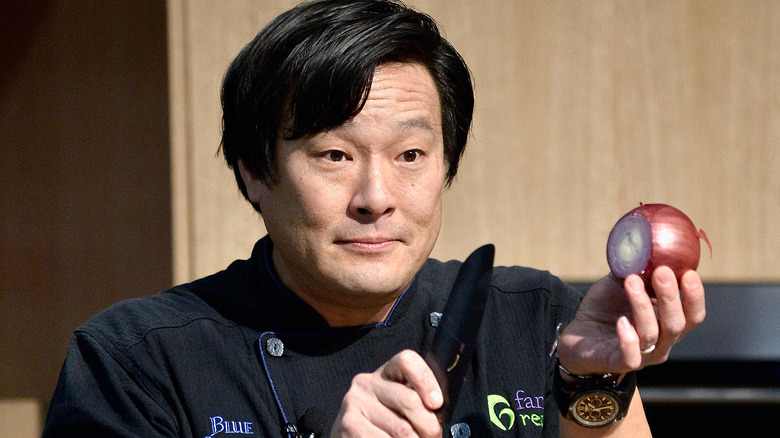Ming Tsai Reveals What You Need To Cook Good Asian Food At Home - Exclusive Interview
To look at the career of Chef Ming Tsai today, and you'd never think he considered doing anything with his professional life other than pursing his passion for the culinary arts. And here's the secret: he didn't. That degree in mechanical engineering from Tsai earned from Yale? Just a quick blip on the radar. Because Tsai grew up around cooking, it was only natural he would gravitate back to it — eventually launching his award-winning restaurant Blue Ginger, in addition to multiple cookbooks, and his Emmy-nominated show "Simply Ming."
Every story starts somewhere, and as Ming Tsai told Mashed during a recent interview, the central narrative of his life story started in the kitchen of the restaurant his parents opened in Dayton, Ohio, called Mandarin Kitchen. But then again, in another way of thinking about it, Ming Tsai's story starts years earlier, woven into the greater story of migration to the United States; for many years, Chinese immigrants felt themselves relegated to but a few professions — as Tsai put it: "build the railroads, then the Gold Rush, [then] cook." Today, of course, Chinese-Americans are a part of every sector, from tech to politics to education and beyond.
For Ming Tsai, with all the many roads he could have taken in life, the choice to pursue cooking was a return to the roots of sorts, but only to touch base and then forge a new path forward, for himself and for Chinese cuisine.
Chef Ming Tsai's journey to the world of professional cooking
Was it a foregone conclusion that you would end up working in food, or did you see yourself heading in a different direction?
[The] easiest way to explain this? I'm a good Chinese boy. Meaning my parents were like: "Hey, you can be a doctor, lawyer, engineer, anything you want." So that's why I studied engineering. I was good in science and math, probably better than the other side of the coin. Having gotten into a good college I'm like, "I'm going to do mechanical engineering, because that's something I'm interested in." But in my head I was already cooking a lot. I already worked in my mom's Mandarin kitchen at age 14 and 15 and 16. I already got the restaurant bug, which is so simply, "You can make people happy through food and get paid for it? That's a fantastic potential job for me!"
So even while I was in college, every summer for four years I went to Paris, mastered French, [did] these apprenticeships at Boulangerite. Junior year went to Cordon Bleu, and after Cordon Bleu I'm like, "Holy s***, the French can cook!" I wanted to do, thank God this name didn't stick, "Frenese Cuisine." French/Chinese. Really bad name, didn't stick. East-West is what we call it. So junior year I knew, I definitely want to be a chef. That solidified it, because obviously, I knew Chinese food, and that was here already. And French food is just a different level, right? I'm not saying it's better, it's just different. Just like Japanese is different, right? It's not better than Chinese, it's just so different. So I really wanted to blend this all ... my culture, as I just love cooking.
And I was, still am, and will always be hungry. That's why I'm a chef. Very funny quick story, I sit my parents down after this junior year summer in Paris. I'm like: 'Mom, dad, I want to be a chef. I don't want to be an engineer. I'm going to finish the degree, because you need the piece of paper, because lots of money is spent. So I'm going to get my bachelor's, but then I want to move to Paris right after I graduate.' My mom, if you've ever seen on my show, gives me a huge hug, says: 'Son, you're so lucky at a young age, follow your passion, promise to give 110%, we wholly support you.' Keep I mind, I'm first-generation Chinese. My parents were born in Beijing, my grandfather went to Yale in 1918. I got the most amazing education to become something not a cook, right?
The Chinese came here, built railroads. Then the Gold Rush. Then all these Chinese men went to basically San Francisco with the only career they could do is cook. So I do all this great education, then I go back-asswards to become a cook. But the best way to describe my parents is, they're just cool. Even though they're born in Beijing, and even though all these rules you have as being an Asian good boy and all that, they actually cared about my happiness above anything else. Which, I'm so blessed. Because 99% of those Chinese parents or Korean parents or Jewish parents or whatever parents would be like, "You're crazy, you're going to go cook after this, this, and this?" So my mom hugged me, and my dad, who you need to know, is a graphite designer, works with NASA, Ferrari, Callaway, designs rockets, spaceships. He's literally a rocket scientist, he looks at me, he goes, "Son, you weren't going to be a great engineer anyway, go cook." I'm like, "What? Dad?"
Look, if you're not passionate about something, how could you possibly be great at it? I never looked back. Now, honestly, it's come full circle. I've been designing lots of kitchen equipment with HSN, because I'm a host on HSN. So a pressure cooker, the induction burner, magnetic technology. I'm actually using my degree, and it's kind of funny. Twenty years later — I'm just slow to use my degree, that's all.
Ming Tsai on the misconceptions about Chinese food
What are some of the common misconceptions about Chinese food that you wish people better understood?
You've got to go back because when Chinese food was first introduced to this country, it was viewed as inexpensive food, big platters, you can go to Chinatown, you can pay 10 bucks a head for a group of eight and have a fantastic meal. You still can, right? That is the great part of Chinese food, is you can eat really well inexpensively. To make a leap to fine dining is really hard ... Typical Chinese food in this country has always been viewed as delicious but feeding the masses. It's by far the most popular food, and I can speak for all chefs. We all end up in Chinatown after an event, period ... it's the favorite food of all of us chefs. Why? Because it's delicious, it's mostly plant-based, right? There's a little bit of meat for protein, for flavoring, but we don't eat a huge steak. You can eat it and of course, the old adage, you're hungry two hours later after you've eaten Chinese food, it's actually true.
But the biggest misconception ... it's about MSG. It's a crazy story. I don't know if you know the whole story ... and no one knows the truth. But there was an article that got published in the medical journal of science, a real published medical article. It basically in that article ... some schools of thought said it was a joke, that it was a Caucasian man who made up an Asian name, and he just did that because he had a bet with a fellow doctor. He was an orthopedic. His friend said: "You'll never get in the journal of science, you're just an orthopedic, you're a pathetic doctor." They made a bet, he got it in, that was the joke.
And that joke, the repercussions are unbelievable. Fifty years ago, hundreds of articles came out about you get numbness of the neck and the limbs if you eat Chinese food because of MSG. It all got debunked. MSG is no worse for you, it's actually maybe even better for you than salt. Because you can use less of it, and sodium's not good for your body. If you can use less of sodium, that's actually better for your body. It's a glutamate. It naturally occurs in seaweed, it actually occurs in Parmesan cheese and soy sauce. It's not anything bad. But because of that one article, a lot of people were like: "Nope, I can't do Chinese food. Too much MSG, I don't want to eat chemicals."
That didn't help the industry at all. I think now, David Chang's running the forefront, he has MSG shakers on the table, right?
But I've been asked many times to do a fine dining Chinese restaurant. When you get to fine dining Chinese, in Hong Kong, Beijing, Shanghai, it becomes about the products. The baby abalone, the shark's fin soup — which I have not had in 20 years, once I learned about finning, can't touch it — the bird's nest soup. These are incredibly expensive, extravagant things that the American palette won't get. Because there's not a lot of flavor in some of these things.
Bird's nest soup, you drink it because apparently for us men it gives you strength and all that. Incredibly rare, incredibly expensive because it's so dangerous to get. It would be so not appreciated in this country, if you could drink a $200 soup. Because it doesn't have that much flavor, but it's so much more about medicinal qualities and the history to it and texture. Chinese food's about texture. So that's why it'd be so hard to do a high-end Chinese restaurant because in this country, most wouldn't get it. The Chinese that emigrated here would be like, "Oh my God, baby abalone, steamed ginger, that would be awesome." They'd pay 100 bucks, no problem. But that's a very small percentage of this country.
Ming Tsai on Asian representation in the modern American culinary scene
What are your feelings about Asian representation in the American culinary world these days?
I think now, we're pretty well represented, right? We have some of the best chefs of the country. I mention Corey Lee being as one of them. Obviously [David] Chang, Suzie Lee in Canada, all the Japanese, Nobu, Morimoto, there's so many great Asian chefs. Because, over the last 20 years, with Food Network and PBS, the world got smaller. You can get every ingredient you want 24/7 now, it doesn't matter where you live. You can get fresh yuzu, sudachi, you can get all these amazing things, you can get white soy sauce. Every chef, I say, in this country, is doing East-West cuisine. They don't call it that. Thomas Keller calls it New French. Ken Oringer calls it New American. José Andrés calls it New Spanish. They're all using Asian ingredients and techniques, because why? Because it's delicious and bold flavors, and those flavors either come from either India or China or Korea or whatever.
All chefs always blend ingredients and whatnot. Besides us Asian chefs representing [ourselves], there's also all the other chefs that are really helping represent, introducing this very rare toasted sesame oil, or the white soy sauce, or this miso made in a small village out by Hatchamiso, outside of Kyoto. Those help to elevate Asian cuisine. What I love seeing now is a lot of us Asians aren't any more the typical soft-spoken, don't want to go out to the dining room, don't want to talk to media. You have the David Changs of the world, you have me, and you have a lot of people that are so proud and happy to talk about our food and push it in the forefront.
The one thing that I think is greatly helping, certainly for me — and I'm actually wearing it on my chest here, [this] MingsBings [shirt] — is a lot of Asian food is plant-based, plant-focused by the design of the cuisine. Chinese food didn't decide to go plant-based, it's always been plant-based. We always use a little chicken to flavor a huge dish. I use this example all the time. A ribeye steak that we eat in this country, one person, could feed 10 people just as well, probably more deliciously, with water spinach and garlic and ginger and whatever. That thinking of eating delicious food that's actually good for you and good for the planet, because I do believe in science, like gravity, and warming, and world pandemics, and vaccines, I believe in all of that.
Why Ming Tsai created MingBings
Tell us a little about MingBings.
We're talking about putting Asian food in people's hands. One of the biggest problems with Chinese foods is they're all stir-fries. It's all served on noodles and rice, and you can't drive a car and eat a Chinese container, right? Impossible. I really wanted to continue to do my food in a more convenient way for people at home, and hence I created MingsBings. There's a whole backstory, and if you go to Mingsbings.com, you can learn why my wife had a health issue, and we wanted to recreate something that she could eat while I was traveling. That's all 100% true. And besides, like I said, do good for your body, do good for the planet, you also do good for your soul. Because some proceeds of the sale of MingsBings benefit Dana Farber and Family Reach with financing help for families with cancer. So it's taste good, do good, feel good. The reason I really am so excited to introduce this, because it's still, by the way, it's still based off of a traditional Chinese dim sum, called a Bing.
This country is not that familiar with the term bing. Obviously, it rhymes with my name, so it's a good marketing, MingsBings. But it's a traditional [food]. In Thailand and Beijing they have a hockey puck-shaped dumpling that's pan-seared like a potsticker, that is delicious, filled with juicy pork, sometimes seafood as well, that's a traditional bing. I wanted to redefine that, because my goal is I want people to be able to drive a truck and eat Chinese food and eat something delicious and eat something that's plant-based and good. As you know, you've probably seen all the veggie patties currently in the grocery store, the Praeger's, the Boca's — the garden burgers. But they're kind of dry hockey pucks that you've got to put lettuce and tomato and avocado and put in between a bun to choke them down. They're just emulsified.
I flipped the paradigm. I wanted to put the emulsification on the outside. I just wok-stirred my filling, then I came up with this gluten-free, basically, brown rice wrapper that is super crispy. And the best way to describe it for people who say, "What's a MingsBing?" It's a redefined Hot Pocket. It's the first Hot Pocket that's good for you, that's delicious, that's gluten-free, peanut-free, tree nut-free, all the above. The original Bing is eight super veg. You are what you eat. Because I designed it pre-dipped in oil, so easy for the home cook, just like a Hot Pocket. Air fryer, oven, sauté pan, all super easy ways to cook it up.
You know that you can eat guilt-free because it's plant-based and good for you, and the best response that we've received over the year is kids love them too. Even the eight super veg one. Because there's garlic and onions, which of course, anything's going to taste better with garlic and onions. Now we have a cheeseburger, a sausage with peppers, a fiesta Bing with chorizo, and a buffalo cauliflower. All vegan, all gluten-free, nut-free. I'm so excited about it because it's really going to bring in flavors that people can eat conveniently and feel good about themselves. Down the road, there's some fantastic plant-based chicken and pork coming out. Just imagine General Tso's, Kung-Pao chicken. All of these stir-fries. Anything you could stir-fry, you can now eat in a Bing, and that's the goal.
Ming Tsai offers tips for Asian cooking at home
What are some of your tips for people who want to improve their own Asian cooking at home?
If you want to improve your Asian cooking at home, you need some essential tools. You need a wok. You really need a wok. Why? Because a wok, and by the way, for a home cook, make sure it's a flat-bottom one. Doesn't have to be a Simply Ming wok, but if it is, my kids will go to college, so thank you. Flat-bottom is key, because no one has a 60,000 BTU burner at home, right? So when you have that round wok on a ring, your wok is like four inches away from the flame. It'll never get hot enough. You have to have flat bottom. I do like nonstick. It doesn't have to be mine, again, but nonstick is good because again, without a 60,000 BTU burner, you can't re-season the wok like we do in my restaurants, right? And that's when you have a regular steel wok. A wok is key.
Why? Because a wok, it heats on the bottom [and] on the sides. The whole art of stir-fry is: "Ch-ch-ch-chh!" You have to hear that [sizzle] sound all the time. One of the best tricks is whatever recipe you're doing, my recipes, or Martin Yan's, or any stir-fry recipe, usually for the home cook, buy the ingredients to make the full recipe but cook it in batches. Because if you try to put that whole pound of meat sometimes in a wok, and if your burner's not big enough it sizzles, then it starts to braise. You lost the whole art of wok cooking, which is super hot flame, hitting it, cooking it, then out of the wok. In Chinese cooking, usually, always start with garlic, ginger, and oil. Sometimes scallions, sometimes not. But garlic, ginger, oil's a secret, in the wok, that garlic ginger flavors the oil. Then usually you do your meat, the protein first. It's called flashing.
And you cook that, my suggestion, in two batches. Flash half the meat, whatever your chicken or beef, whatever. Set it aside, flash the second half, set it aside. Then usually you add your vegetables, your aromatics, and then your protein back in. If you have the recipe, you'll maintain that hot sizzle wok, which is so key. The other two absolutely key ingredients, you have to have a good knife and a good cutting board. It sounds so basic, but I see people's homes, they have these little plastic ones and they slide around, their knife's not sharp. You're going to prep so much better, and you'll have more fun at it if your knives are sharp. Get good knives and make sure you keep them sharp ... Knife, board, and a wok, you're off to the races.
[Also] you have to have soy sauce or tamari, so if you want gluten-free, go tamari, or soy sauce. Sesame oil, as long as there's not an allergy. I love oyster sauce, or veggie oyster sauce. Wan Ja Shan makes a great veggie oyster sauce made from shiitakes. Hoisin sauce, fantastic for braising and barbecuing, if you like chicken barbecue. It's the Asian barbecue sauce. And rice vinegar. You need acid to help balance all of these flavors of Asia. Then last but not least, my two other flavors, because I love Sichuan food, is chili, so good, Chinese dried chilis. And citron peppercorn. Because citron peppercorn numbs your mouth, which is the whole art of citron food. By numbing your mouth, you can eat more spice. Have those basic ones in your pantry, and you can cook Asian food, you can cook Chinese food.
Ming Tsai on the most underrated Chinese dish
Is there an underrated Chinese dish that you wish more people knew of and that got more respect?
I actually grew up eating it all the time because my parents made it, it's Xi Fan, or Jook, it's the Chinese porridge. It's traditionally made from leftover rice, then you just keep adding more water to your pot, and you keep boiling it till it gets like oatmeal texture. When you make it with flavor, mine's usually just water and rice, right? So it's not that flavorful, but it's the platform to eat up all the leftovers from the night before. That's how we eat Chinese breakfast. We'll eat a beef and broccoli, whatever the leftovers is. Plus usually a fried egg or two. I think it's the best way to start your day because it's a good, healthy meal. You get your grains, you get some protein. I have made it, when you make it with chicken stock, a royal chicken stock, which is chicken stock made with chicken stock, when you start with that instead of water, it's so good.
But I love savory. My wife can't stand savory for breakfast. I would eat a double cheeseburger animal style, double double, if I could for breakfast. I think Xi Fan, I think that doesn't have much respect. Because it looks like porridge. People think of the old classic stories, "Can I have a bowl of porridge?" But it's so much more. I've seen it elevated in fine dining restaurants, because if you don't cook it all the way, it's very similar to a risotto, if you would. It has that nice, silky texture. Again, you don't want a huge bowl of it, but you can do a nice, thin layer of it. And again, made with the double royal chicken stock, it's freaking delicious.
Writing cookbooks came naturally to Chef Ming Tsai
Had you always planned to write cookbooks? Or did someone else put the idea in your ear?
I've always planned to be a chef, since [I was] young. So I wanted to do that. But I never planned to be on TV. My goal was not, "I want to be a chef on TV." No. I wanted to be a chef that made good food and made people happy with good food, that was my goal. Food Network kind of came out of the blue. Food Network was just up and coming, they had a show called "Dining Around." Nina Griscom and Alan Richman were the hosts. They would spend 10 minutes with chefs around the country. Turned out, it was their talent search show. I didn't know that. They were claiming they were just trying to see if there were other chefs that could actually slice and dice and smile, and talk to the camera at the same time. I'm very confident, and the cameras never scared me.
I remember the first thing I said on my show, the first time ever on TV, I said, "Hey, I'm Ming Tsai, I was born Chinese and I'm still Chinese, and today I'm cooking lamb." I had a little sarcasm, it wasn't that funny. But just the point that I tried to be funny got the executives that saw this show thinking, "Hey, maybe let's bring him back and do this and do that." The reason I say all this is once you have a TV show, books? It's the icing on the cake. Because now you have X millions of eyeballs. Food Network was absurd for me. I was basically one of the five originals. They played my show three times a day, "East Meets West." It's [the] thing that really helped me, at least for notoriety, it didn't help me be a better chef ... But it was airing at 2:00 or 3:00 a.m., too.
So every cook in New York or Boston would still see it, too. So it wasn't just a 6:00 p.m. show, which only a certain demographic can see. So every demographic could see it, which exploded Food Network. I was blessed. I say it all the time. We all say it. We got to ride Emeril's [Lagasse] train. Emeril, he was the freaking choo choo master and we just kept jumping on his train. He had a formula, he made food fun, he made it approachable. That kind of opened the floodgates for all of us ...
As people start cooking more at home, which of course COVID really made people cook at home, I always say this, my cookbook, no one's cookbook is gospel. It's pages of inspiration that hopefully, you learn a technique, and then you add your own. You want spicy? You add jalapenos. You hate watercress but you love spinach? Then you substitute. You're not a fan of chicken dark meat? Then use white meat. The salmon doesn't look good? Buy swordfish. Whatever it is, once you start substituting and adding in the things that you like, then you're cooking. That's the whole goal, right? Anyone can copy a recipe. But when you start adding your own personalities to it, you're really cooking, that's the joy. Then, wow, it actually tastes good. And you get a really good self-satisfaction when you make a dish for you and your family, and it actually tastes good. It's a great feeling.
How Ming Tsai chooses his cookbook topics
What's your process for choosing which recipes make it into a cookbook?
Most of my cookbooks have been 80 recipes. It depends on the theme of the book. I've had a whole bunch of different things. One was "Master Sauces." I make a mango chutney then I make three dishes from the mango chutney. I have scrapped very few recipes in a cookbook because by the time I write it out, I really make sure there's a balance of whatever it is. It could be balance of proteins, or a balance of techniques, so frying and searing and baking and wok stirring. And you can't have 45 chicken dishes, right? It has to be a balance in a book. I always had vegetarian as well. Every recipe that I first come up with, it always gets altered and changes because you're measuring, right? So a pinch of salt, or two tablespoons of soy sauce. That changes.
But to be honest, the base of the recipes, the wok stirred ginger eggplant, is going to stay the wok stirred ginger eggplant, it just may have some more chilis or less vinegar or something like that. But for me I think it's really important that you lay out all the recipes, and you look at the crossovers, the similarities, and just make sure you're not too heavy in any certain category, I think is a great way to do a balanced cookbook. Because you want someone to pick it up that's like, "No, I don't eat meat," or "Oh, I love chicken," or "Oh, I love vegetables." You try to have something for everyone, because usually when the book gets to the people's home, someone else does like the meat, even though the person that bought the book doesn't like the meat.
I like to have that variety. I've yet to do a grilling cookbook or a frying cookbook or anything. I've not done that yet. I've not done a cookbook in years, because I'm doing more Zoom cooking classes. Because it's "Simply Ming" live — you can ask me a question. It's fully interactive, which I love. Because then you can really learn. "Gosh, I've always wanted to know, how come you hold the knife this way?" You get an answer. A cookbook can't quite do that, because you don't know the questions. So the live stuff, so far, it's been great during COVID, incredibly efficient.
Chef Ming Tsai talks TV cooking
What are some of the challenges of cooking on TV that you don't face when the cameras aren't rolling?
Technical challenges. Specifically, I just talked about my Zoom cooking classes like we're doing now. Sometimes wi-fi, you have all those challenges. But time goes so fast when you try and do three shows a day. So when I shoot "Simply Ming," I do three a day. I used to do five a day with "East Meets West." You have to be so hyper-organized. You can't afford to go buy another head of romaine, you don't have the 20 minutes to send someone to Whole Foods. Hyper-organized. A restaurant needs to be that organized as well, but you can always substitute in restaurants and things like that. When you're doing a TV show, your recipe's locked and loaded, right? You're posting it, this is what it is. I can't put broccoli instead of cauliflower, it doesn't work. So it's very exacting.
You have to make sure when you're doing the cooking show that you really, slowly explain everything you're doing and why I'm adding lime juice now versus lime juice later, or why I'm seasoning every time I season in layers. When I add something, when I season, I do something else too as I season. It's a much more methodical and slow process, because you have to explain it as you're going. When you're just cooking in a restaurant or at home, you just go to town and boom, you just taste, nothing changes. You've still got to taste to make sure it's seasoned well, but you don't have to slow it down to teach. We're just cooking.
Also, you have different categories of people that all have to be spot on. If the sound guy screws up, you don't have a show. If one camera guy was supposed to get that moment when I took the thing off the pot and he misses it, then it's over ...
The food, again, it has to be perfect. If I do anything baking and stuff, there's five swap outs, right? Okay, here's the egg whites. I can't wait 10 minutes to do egg whites. Now and here's the egg whites after 10 minutes, and here's the right this or that, and you have to do all these stages. That is so much harder than just cooking, because you have to show each stage. We did a roast turkey, shouldn't be that hard, a roast turkey show. Oh my God, I had like 10 turkeys. Turkey frozen, here's one defrosting, here's a brine, look at pre-brine. It was the hardest show ever to do. I didn't think that one through. We had like 10 turkeys, we had turkey meat for a few weeks, actually. It was pretty funny.
But again, hyper-organized, but you have to make sure everyone is on their job, because if one person's off, you don't have a cooking show. If one person's off in a restaurant line, unfortunately, that customer may have a bad dish because it came from Henry cooking the bad dish. But everyone in the restaurant's not going to have a bad dish. If one thing goes wrong in a cooking show, you can't have the cooking show. Someone cuts themselves, stop, you can't have blood on a cutting board, and this happened, Nancy Silverton, one of the best chefs ever, of all things, we had a brand new food processor. And all the chefs do this, we always touch knives to see how sharp. She touched the blade to see how sharp it was. Well, it cut her, it was really sharp. It was brand new, out of the box. So you know, a half-hour delay because blood and pastry dough just doesn't quite work. Sorry, I wasn't throwing you under the bus, Nancy, I was just giving an example. She's one of the best there is.
Ming Tsai talks cooking against Booby Flay
What was it like competing against Bobby Flay on "Iron Chef"?
It was a highlight. One of my most fun experiences — so fun, and I'm the most competitive guy I know. I used to race my kids going up the staircase in my home when they were three or four or five, and I would push past them to make sure I won. My wife's like, "Let them win." And I'm like, "Never." They will beat me, handily, one day. But I'm not going to let them win. I'm so competitive. And to be able to do it with cooking? I just loved it. Bobby, obviously, is incredible at what he does. All these Iron Chefs were amazing. Morimoto San was always my dream to go up against, because even though we're the same age, he's still one of my idols just by the techniques he has, he is unbelievable. [With Flay], it was Battle Duck, I was so stoked it was duck. Because I love cooking duck. Bobby almost rolled his eyes a little bit when he saw it was duck because he's like, "Oh God, Ming's going to be pretty good with duck, he's Chinese!"
He's right, I love duck. I knew if it was duck, I was going to do a Peking duck, which doesn't usually get done in an hour, obviously. But I was so psyched. Because I practiced it. On "Iron Chef," you actually get three secret ingredients a month out, so it was chicken, squab, or duck. So I practiced chicken, I practiced squab. We don't know till it's revealed what it is. So it is true. But they want both chefs to do really great food and someone's going to do even better. They don't want mediocre food. It is for TV, so it makes sense. Because if you don't practice, and some guys go in cold and don't practice, they fail miserably. You can't do five dishes in an hour, times four plates each, if you haven't practiced it. It's so hard.
So I was very psyched it was Battle Duck. I also had the pressure of the entire Chinese race that if I lost to a Caucasian in Battle Duck, I would be ostracized from every Chinese restaurant in the country, and my kids would be like, "Why are we eating Mexican? I want dim sum!" Sorry, we can't go in the restaurant. I had that pressure, too. I could not lose Battle Duck to Bobby. Fortunately, everything worked out, you never know if the foie gras crème brulee's going to work out, or the Peking duck's going to be crisp. But it was a blast. And the hour goes by it's like, what? Thirty minutes gone? You can't believe how fast.
By the way, for the record, it's a true 60 minutes. They don't pad it, they don't give you more time. I have seen some shows, if someone really cuts themselves bad, they make both chefs stop, right? Because again, they don't want someone to hurt themselves. That's the only time I've seen it be over 60 minutes, but no one was cooking during that 60.
Chef Ming Tsai's favorite dish to cook and the food he'll never eat again
What's your overall favorite dish to prepare?
My favorite dish to prepare actually is my new tea-smoked Peking duck. So I've combined 2,000-year-old traditions, Peking duck, of course, you blow it up, you hang it, you salt it, then you roast it the next day, it's a 24-hour process. In tea-smoking, you actually usually blanche in water, you brine it, then you smoke it. I have these great vertical ovens here at BaBa, so I've combined the technique. I've never heard about anyone trying out a tea-smoked Peking duck. But since it takes 36 hours now because you do the whole thing, you blow it up, then you smoke it, then you roast it, I think it's definitely the best duck I've ever eaten, and I've eaten duck all over, because the French loved duck and us Chinese love duck. Most countries love duck.
Because it's such an intricate process, and because the result is so good, super crispy, and a really good meat, probably Peking duck, quite often, the meat doesn't have much flavor. This has awesome flavor because it's been smoked. So it's a labor of love because it takes so long to do. People have to order it in advance. We sell 10 ducks a night, that's the most we can do. Every night, we sell 10 ducks. So yeah, I think that's my fave. It's what I would want to eat with a good glass of DRC from France, a little pinot noir, and a Peking duck and you can take me out.
Is there a dish you would just as soon never prepare again?
Yes. I was in the Keys with my wife, she had a house there. We're the only two people there, it was during a thunderstorm. We had no groceries, we just showed up. And I rummage, I'm like, I'll make something, I'm a chef, this is fine. I rummaged through everything, freezer, fridge. They had Tuna Helper, and cans of tuna. So I made it. But I made it like a chef, so I seasoned as I went, not thinking. We took one bite, it was the saltiest thing I've ever put in my mouth. We looked at each other, we just drank a six-pack and went to bed. So I'm never going to make Tuna Helper again in my life.
To try your hand at Ming Tsai's recipes, check out his cookbook "Simply Ming In Your Kitchen". Keep up with all of the chef's projects on Ming.com.
